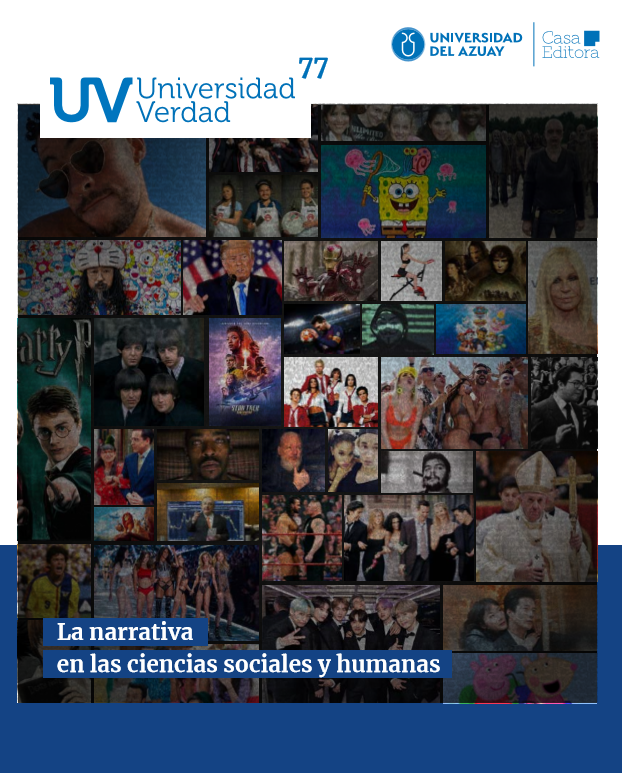Narrative Crossroads in Ecuadorian Fieldwork
DOI:
https://doi.org/10.33324/uv.v2i77.308Palabras clave:
ethnography, fiel work, ontologyResumen
The qualitative researcher is often described as a bricoleur who prepares a representation from multiple fragments of documentation yet, always involved in one way or another paying attention to situatedness and its neglected possibilities and temporalities in the web of everyday research life. At this narrative crossroads, fieldwork practices constitute ethnographic concepts composed of both separation and connection and are thus worlding tools that enable political thought and practice beyond the onto-epistemic limits of modern knowledge. In revisiting our fieldwork narratives from the paramo of the Southern Andes and the beach of the Pacific Coast of Ecuador, we begin to explore the neglected epistemic potential from the hands-on agencies of the practical and material consequences of our thinking.
*****
El investigador cualitativo se describe a menudo como un bricoleur que prepara una representación a partir de múltiples fragmentos de documentación, pero siempre, de una forma u otra, prestando atención a la situacionalidad y sus posibilidades y temporalidades desatendidas en la red de la vida cotidiana de la investigación. En esta encrucijada narrativa, las prácticas de trabajo de campo constituyen conceptos etnográficos compuestos tanto de separación como de conexión y, por lo tanto, son herramientas de mundo que permiten el pensamiento y la práctica políticos más allá de los límites onto-epistémicos del conocimiento moderno. Al revisar nuestras narrativas de trabajo de campo del páramo de los Andes del Sur y la playa de la Costa Pacífica de Ecuador, comenzamos a explorar el potencial epistémico desatendido de las agencias prácticas de las consecuencias reales y materiales de nuestro pensamiento.
Descargas
Citas
Andrews, M., Squire, C., & Tamboukou, M. (Eds.). (2013). Doing narrative research. Sage.
Bhattacharya, H. (2008). New critical collaborative ethnography. Handbook of emergent methods, 303-322.
Bellacasa, M. P. De la (2017). Matters of care: Speculative ethics in more than human worlds (Vol. 41). U of Minnesota Press.
Bhabha, H. K. (1994). The Location of Culture London: Routledge.
Boltan, L., Lattas, A., Redmond, A., Rumsey, A., Rose, D. B., Silverman, E. K., ... & Wassmann, J. (2012). Emplaced Myth: Space, Narrative, and Knowledge in Aboriginal Australia and Papua New Guinea.
Bourdieu, P. (1980). 1990. The logic of practice. Trans. Richard Nice. Stanford, Calif.: Stanford University Press.
Bruner, J. S. (1990). Acts of meaning (Vol. 3). Harvard university press.
Burr, J. (2010). The Altruistic Self and the Desire of Developing Others: Towards a Post-development Ethos of Action (Doctoral dissertation, Dalhousie University).
Carr, A., Abad Merchán, M., & Ullauri, N. (2020). Conversations about disasters: listening to Ecuadorian children. Children's Geographies, 18(2), 222-233. https://doi.org/10.1080/14733285.2019.1630712
Carr, A., Abad Merchán, M., & Ullauri, N. (2020). ‘They are here to look after the land’ submitted to Local Environment, June 15, 2020.
Cammarota, J. (2011). Blindsided by the avatar: White saviors and allies out of Hollywood and in education. Review of Education, Pedagogy, and Cultural Studies, 33(3), 242-259. https://doi.org/10.1080/10714413.2011.585287
D’Arcangelis, C. L. (2018). Revelations of a white settler woman scholar-activist: The fraught promise of self-reflexivity. Cultural Studies↔ Critical Methodologies, 18(5), 339-353. https://doi.org/10.1177/1532708617750675
De la Cadena, M., & Blaser, M. (Eds.). (2018). A world of many worlds. Duke University Press.
Fanon, F. (1970). Black skin, white masks (pp. 13-30). London: Paladin.
Lincoln, N. K. D. Y. S. (2005). The Sage handbook of qualitative research. Sage.
Hudis, P. (2015). Frantz Fanon: Philosopher of the barricades. Pluto Press.
Jin, L., & Cortazzi, M. (2002). Cultures of learning, the social construction of educational identities. University Press of America, Inc.
Kabeer, N. (2001). Reflections on the measurement of women’s empowerment.
Kasten, M., Sneller, R., & Paul, H. (2012). Hermeneutics and the Humanities. Dialogues with Hans-Georg Gadamer. Leiden University Press.
Nagar, R. (2014). Muddying the waters: Coauthoring feminisms across scholarship and activism. University of Illinois Press.
Ricoeur, P. (1991). Narrative identity. Philosophy today, 35(1), 73-81.
Rinaldi, C. (2001). THE PEDAGOGY OF| _| STENING The Listening Perspective from Reggio Emilia.
Spillers, H. J. (2004). Topographical topics: Faulknerian space. The Mississippi Quarterly, 57(4), 535-568.
Verran, H. (2001). Science and an African logic. University of Chicago Press.
Verran, H. (2017). Matters of Fact(ization), Matters of Capitalization, and Matters of Care, EASST, 36(1), 19-20.
Vansieleghem, N. (2005). Philosophy for Children as the Wind of Thinking. Journal of Philosophy of Education, 39(1), 19-35. https://doi.org/10.1111/j.0309-8249.2005.t01-1-00417.x




